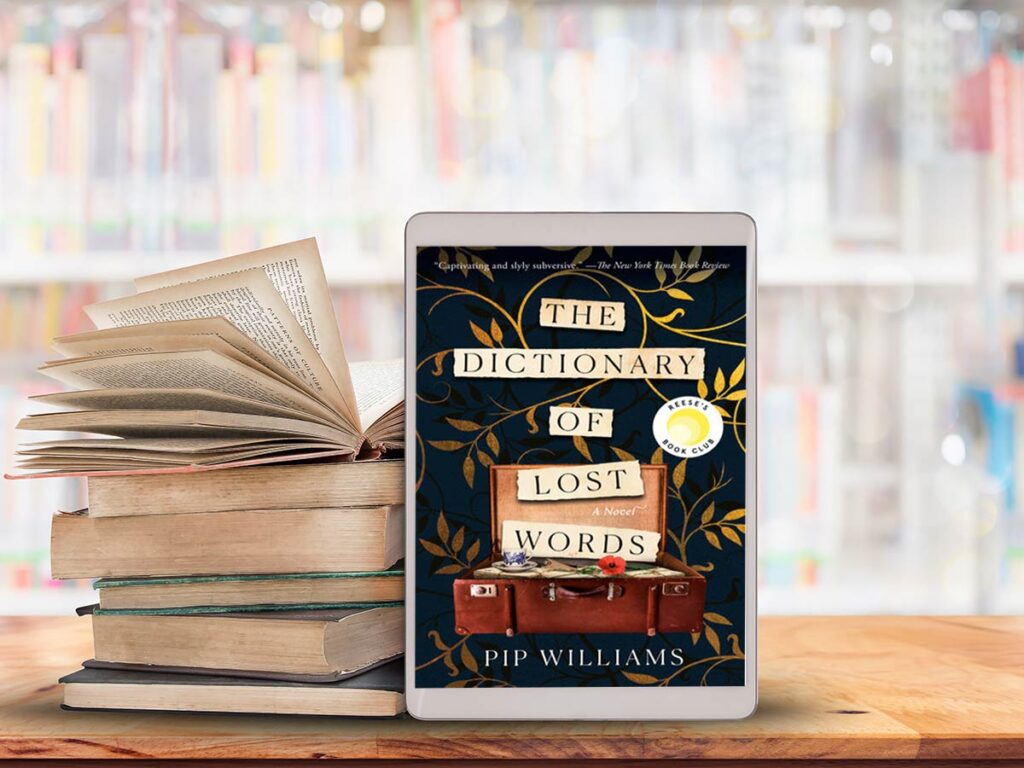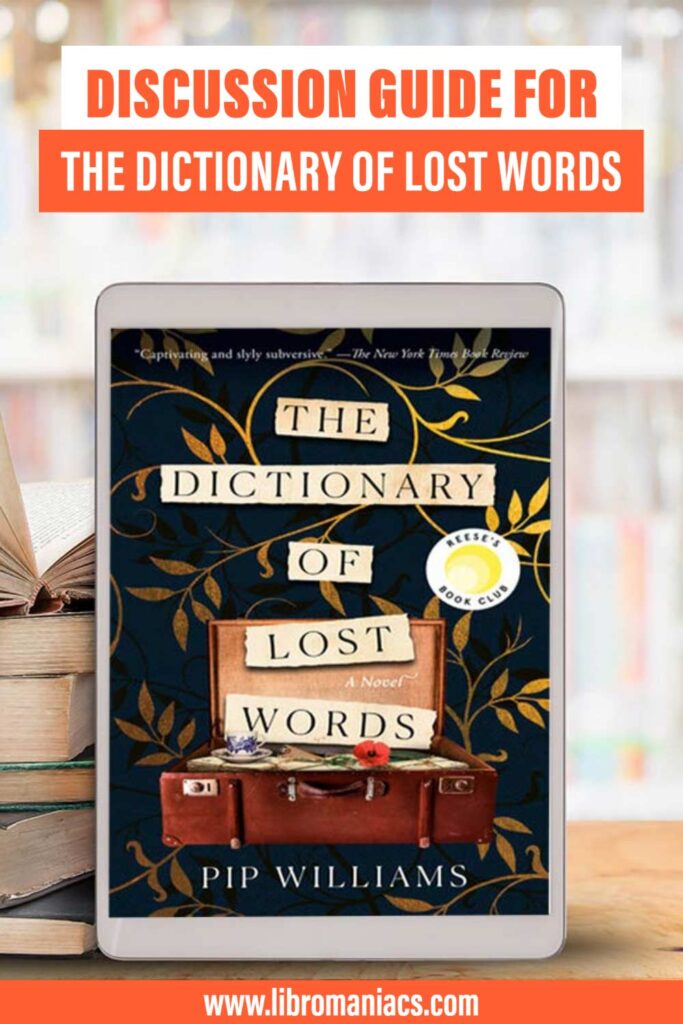The Dictionary of Lost Words is a red alert for word nerds and language lovers. This fictional story follows the true life development of the Oxford English Dictionary (OED). But it imagines how the lack of women’s influence on the dictionary’s development affected the outcome of its original edition. First and foremost, this novel loves words. But the Dictionary of Lost Words also covers themes of loss, feminism, female friendship, the meaning of service and how to find your voice.
And those themes make this a chewy choice for book clubs. We’ve got book club questions for The Dictionary of Lost Words which will help you dive in and get talking. This discussion guide also includes a synopsis, some thought provoking reviews (spoiler- not everyone loved the book) and three related reads.
We’ve even got some advice for you on how to access the OED for yourself.

Dictionary: A book which explains or translates, usually in alphabetical order, the words of a language or languages (or of a particular category of vocabulary), giving for each word its typical spelling, an explanation of its meaning or meanings, and often other information, such as pronunciation, etymology, synonyms, equivalents in other languages, and illustrative examples.
Oxford English Dictionary, Third Edition 2010
(This article contains affiliate links. This means that if you choose to purchase, I’ll make a small commission.)
The Dictionary of Lost Words Synopsis
The Dictionary of Lost Words, Pip Williams
Esme is born into a world of words. Motherless and irrepressibly curious, she spends her childhood in the Scriptorium, an Oxford garden shed in which her father and a team of dedicated lexicographers are collecting words for the very first Oxford English Dictionary. Young Esme’s place is beneath the sorting table, unseen and unheard. One day a slip of paper containing the word bondmaid flutters beneath the table. She rescues the slip and, learning that the word means “slave girl,” begins to collect other words that have been discarded or neglected by the dictionary men.
As she grows up, Esme realizes that words and meanings relating to women’s and common folks’ experiences often go unrecorded. And so she begins in earnest to search out words for her own dictionary: the Dictionary of Lost Words. To do so she must leave the sheltered world of the university and venture out to meet the people whose words will fill those pages.
Set during the height of the women’s suffrage movement and with the Great War looming, The Dictionary of Lost Words reveals a lost narrative, hidden between the lines of a history written by men. Inspired by actual events, author Pip Williams has delved into the archives of the Oxford English Dictionary to tell this highly original story. The Dictionary of Lost Words is a delightful, lyrical, and deeply thought-provoking celebration of words and the power of language to shape the world.
10 The Dictionary of Lost Words Book Club Questions
These questions have been tailored to this book’s specific reading experience, but if you want more ideas, we also have an article with 101 generic book club questions.
- “Some words are more important than others— I learned this growing up in the Scriptorium. But it took me a long time to understand why.”
Do you agree with this statement? Why are some words more important than others? Or is that even true? - “That’s exactly what I’m thinking Lizzie. A dictionary of women’s words. Words they use and words that refer to them. Words that won’t make it into Dr. Murray’s dictionary. What do you think?”
Consider some words in your everyday vernacular that would never have made it into the original OED. What is it about those words that would have doomed their slips to the fire? - “Bondmaid had come to me— twice now— and I was reluctant to restore it to the dictionary. It’s a vulgar word, more offensive to me than cunt. Would that give me the right to leave it out if I were editor?”
And yet Lizzie considered herself a Bondmaid in loving service to Esme. How do you square their relationship? It was one of love and friendship, but also hierarchy and service. - Why was Lizzy the custodian of the trunk of words? Why didn’t Esme claim it when it was she who filled it?
- Many of the negative or meh reviews of the book complain about the pacing, particularly at the beginning. How did you find the pacing?
- Gareth, who came from a humble background and doesn’t consider himself a poet, writes beautiful letters home to Esme.
Consider Esme and Gareth’s relationship. How was their friendship and ultimate love important to the narrative? - The first wave of feminism and the suffragette movement was roiling through England during the same time that the OED was being developed. Why do you think the author choose to include the movement as a key sub-plot?
- Esperanto is a language designed by Dr. L.L. Zamenhof in an effort to create a lingua franca which would encourage peace and harmony. It sprang fully formed into existence, but never really caught on.
For a book about the English language, Esperanto played an important role in Esme’s life. Why do you think the author chose to weave it in? - In the author’s note, Williams says that “…the book begins as two simple questions. “Do words mean different things to men and women? And if they do, is it possible that we have lost something in the process of defining them?” How would you answer those questions?
- Dictionaries have evolved since the publication of the original OED. They are now updated more frequently and usually include slang and swear words. It seems that they have evolved from being gatekeepers of the language (recording what is right and proper) to chroniclers of the language (and acknowledging common usage).
What role do dictionaries play in your life? Should they be gatekeepers— or chroniclers?
Selected Reviews for The Dictionary of Lost Words
“As readers, we also love words, written words and spoken words. There’s no shortage of sayings describing the power of words. But this novel is about so much more than just words. It is about acceptance of all people and all that they are. It is about who has power and who has control, not just about what goes into a compilation of words, but in politics and in our lives. And ultimately, it is about love: love of language, love of one’s career, love of family and friends. It is about living a life of meaning.”
“Esme too had her trials, often due to choices she made, but I felt like the story was brought down by her constant sadness and long bouts of depression. The character of Lizzie, losing her mother to death at the age of eleven and her siblings to orphanages and becoming a lifelong servant at that young age, is a much more compelling story, for me […] Lizzie’s story ties in well with the part of the story about suffragists attempting to change things for women.”
“I have to admit: this book needs your patience, attention, full focus. (The) first third is overwhelmingly slow but when you get into the story and lose yourself in the precious world of words, connecting with Esme and the preparation process of first Oxford dictionary, your curiosity takes over and you get more excited to learn more by becoming part of the world and linguistics.”
“I really wanted to like this but my pet peeve with historical novels is when the writer can’t stop themselves putting modern sensibilities into the actions, words and motives of the characters. It tosses you right out of the world the writer is trying to recreate. In this novel, it felt as if the writer had more than one ideological barrow to push and in the end, I kept losing the sense of the story and felt like I was reading a woke sermon.”
3 Books Like The Dictionary of Lost Words
If you are interested in spending some time with the Oxford English Dictionary but don’t have the $1,250 for the 20 volume set or don’t want to pay $100 for annual online subscription, never fear. Many libraries actually offer the OED as part of their online catalog. Search your local library catalog or ask at the helpdesk.
If you love reading about words and books, then we have a whole article on books about books that you should peruse. And also a list of books about librarians and set in libraries. And if you want more word nerd books, check out our discussion guide for Babel, by R.F. Kuang.
The Dictionary of Lost Words was also a pick for Reese’s Book Club. If you like her picks, we have a whole batch of book club guides for Reese’s books, including a few that also deal with female agency, like Honor and Such a Fun Age. Or try The Christie Affair, which is also a fictionalized account of a real person.

The Book Thief, Marcus Zusak
This historical fiction is a book about books…and book burning…and how to save the books being burned. And also friendship, resilience and sorrow. It’s a great read-alike if you were touched by the themes of love and loss in Esme’s life.
Set in Nazi Germany, Liesel finds a book in the snow, is taught to read by her foster parents and then goes on a mission to slowly steal books that are in the line of fire. At the same time, her foster family secretly houses a Jew. All of them are just doing what they can to survive a very bleak war.
What makes the book so brilliant is that the narrator is Death himself. His own exhausted point of view brings a melancholy to the story that is surprisingly touching.
Keep the Kleenex handy for this one.

The Professor and the Madman, Simon Winchester
If you are keen to read more about the making of the OED, then this is the book for you.
This is the story of two men who possessed sufficient passion, obsession and erudition to make the world’s first English dictionary happen.
The Professor in the book features our James Murray. He was tasked with creating the Oxford English Dictionary (OED) and, when finding it an utterly daunting task, decided to “crowd source” it by requesting submissions from learned readers around the world.
The Madman was Dr. W.C. Minor, a deluded, mentally ill man who submitted over 10,000 (accurate and well-substantiated) entries while housed in a prison for the criminally insane.
The creative way that the OED came together and the strange relationship between Murray and Minor makes for a pretty compelling read.
This book has also been adapted into a Netflix move: The Professor and the Madman.

Maisie Dobbs (Maisie Dobbs #1), Jacqueline Windspear
If you are keen to read more about independent women making their way in England around WWI and the suffragette movement, then the Maisie Dobbs series will be a great fit for you.
As a young girl (not unlike Lizzy), Maisie was a maid for an aristocratic Suffragette. Her employer recognized Masie’s gifts and helped her gain an education. She becomes a nurse during WWI and later a private detective. Her first case involves infidelity, but it also forces her to confront her experiences during the war.
The full series has 17 books, so if you like the first one, you’ll have plenty more.
Have a listen on Audible. Try audio books for free for 30 days.
Share The Dictionary of Lost Words book club questions with your friends:

